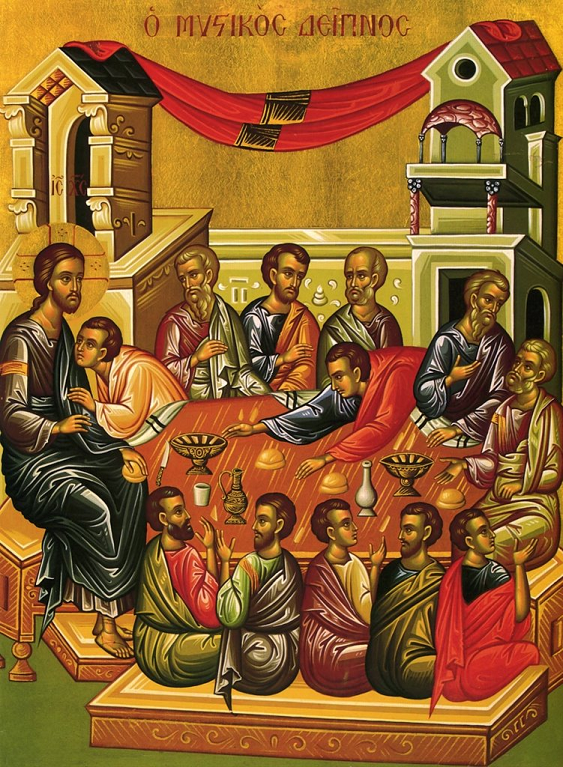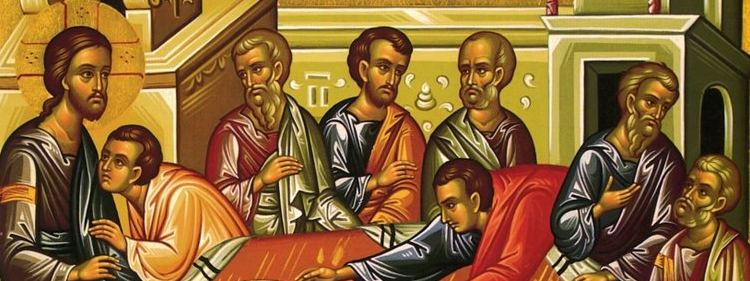A New Commandment
Holy (Maundy) Thursday Scripture Readings

If you saw the weekly email I sent out or consulted our online liturgical calendar, you’ll see that today is called Holy or Maundy Thursday. We know that this evening commemorates the Lord Jesus’s Last Supper with his disciples before his passion, death, and resurrection. Indeed, that was a holy day. But what about that other term: maundy. Where does that come from? Well, don’t worry, I looked it up for you. It comes from the Latin term, mandatum, meaning a command. A few verses beyond today’s gospel reading from Saint John, we read that Jesus says to his disciples, “A new commandment I give you, that you love one another: just as I have loved you, you also are to love one another.” [John 13:34] In fact, that is the theme of the entire Last Supper, according to John. What’s more, John’s is the only gospel that includes the story of Jesus washing the disciples’ feet. And, beyond that, John’s gospel doesn’t even mention the institution of the Eucharist at the Last Supper. What’s going on?
You’re probably well aware that I call John’s gospel the “mystical gospel” because, although John repeats many things that he himself saw and heard as an eyewitness and the “disciple whom Jesus loved,” the meaning of what he experienced takes precedence over the facts themselves. We know that, for example, John moved the date of the Passover from that Thursday night to the following evening, so that everyone could see the parallel between Jesus’s death on the cross up on Golgotha while the sacrifice of the Passover lambs was taking place at the same time in the temple down in the city. In the same way, John moved his discourse on the Eucharist as the Bread of Life out of the Last Supper narrative and attached it instead to the story of the multiplication of the loaves. Why did he do that?
The authors of the Christian Scriptures weren’t historians. They were apologists, writing their stories and letters to explain and strengthen the faith of their audience. With regard to the Last Supper, for instance, the early Church wasn’t following the directions for the Lord’s Supper from the Scriptures when they gathered for liturgy and celebrated the Eucharist. Just the opposite—the liturgy came first, and the Scriptures were written to explain and teach about it. The Scriptures didn’t create the Church and its liturgy. It was the Church and its liturgy—literally, the “people’s work”—that gave birth to the Scriptures. What were the Scriptures addressing concerning the liturgy?
In today’s second reading, Saint Paul is writing to the Church at Corinth, and he spells out specifically the institution of the Eucharist as it was celebrated in their liturgy. Paul is letting the Corinthians have it. According to him, they had lost sight of what they were doing in their liturgy. When they came together, they ate what was called an agape or love meal, and the consecration of the bread and wine using Christ’s own words was to be the central part of that meal. Yet, the well-off brought plenty of food for themselves, turning it into a sort of dinner party, while the poorest of them were left with little or nothing to eat. Some were even getting drunk. Paul had to remind them, in the strongest of terms, what they were supposed to be about. It wasn’t long after this that the agape meal was discontinued so that the community could focus on what the liturgy was truly all about. Paul even goes so far as to say, “For anyone who eats and drinks without discerning the Body, eats and drinks a judgment on himself.” [I Corinthians 11:29] That was why Paul wrote. Now, what was John’s reason in writing today’s gospel?
As much as Paul wanted to focus on each Christian’s intimate relationship with Jesus in the Eucharist, in John’s eyes, some may have taken that emphasis on private, personal devotion too far. Think of the kinds of Eucharistic piety most of us were brought up on. John seems to be saying in this whole Last Supper discourse, starting with Jesus’s washing his disciples’ feet, that liturgy without service to one another is little more than an empty gesture. The disciples were shocked by what Jesus did. Peter, ever the impulsive one, even protested. But Jesus insisted. He was teaching them a profound lesson about Eucharist. First of all, as he so often did, he turned traditional customs on their head. In every culture, students learned by being subject to their teacher. It was an honor to wait on the master and to provide services for her or him. Jesus, the master, waited on his students.
Not only that, but in wealthy households, especially on formal occasions, servants would be provided to wash and dry the invited guests’ feet. Evidently, the little band of disciples had no servants, so people were often left to tend to their own feet, using the water provided by the host. Maybe the disciples, or at least some of them, being rough working men, neglected to wash the dust of the road off their feet at all. So Jesus, besides switching places—master with student—he also took on the role of a servant…not even a student.
Jesus’s humility was obvious, but his point went even beyond that. Servants were paid. Slaves were at least provided with a certain kind of room and board. Either way, they got something out of their service, even if it were just basic survival. Jesus got nothing out of his moment of service, and I think that was his point. Eucharist involves service to one another “for fun and for free.” The disciples were being taught that they should expect nothing out of their loving service of others, and neither should we. This was one of the few times that Jesus gave his disciples explicit directions, saying, “I have given you an example, that so you also should do.”
John is reminding us, members of Christ’s Body, the Church, what Eucharist really means. It means “thanksgiving.” As we join together to give thanks, we, first of all, recognize that we eat and drink the Body and Blood of our Lord. We are gifted with his grace and raised up with him both on the cross and from the tomb. Yet, if the gratitude starts and ends with us, the liturgy is incomplete. The Eucharist is only fulfilled once we carry it into service of one another as Jesus did, for fun and for free. Such is loving service. Such is the fulfillment of Christ’s command—his mandatum—to love one another as he has loved us. As we spend our hour this evening, watching and praying with the Lord before the Blessed Sacrament of his Body and Blood, we kneel before his commandment of love. Such is our work, such is our liturgy, and such is our thanksgiving, our Eucharist.
Get articles from H. Les Brown delivered to your email inbox
